2023届高考英语复合句专题课件(23张)
文档属性
| 名称 | 2023届高考英语复合句专题课件(23张) |

|
|
| 格式 | zip | ||
| 文件大小 | 298.6KB | ||
| 资源类型 | 教案 | ||
| 版本资源 | 通用版 | ||
| 科目 | 英语 | ||
| 更新时间 | 2022-07-31 00:00:00 | ||
图片预览

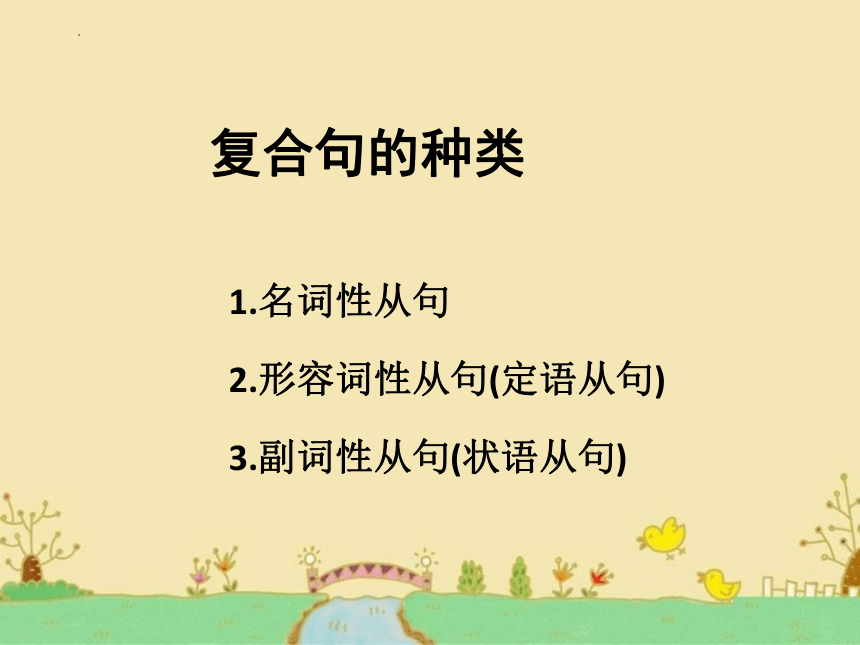


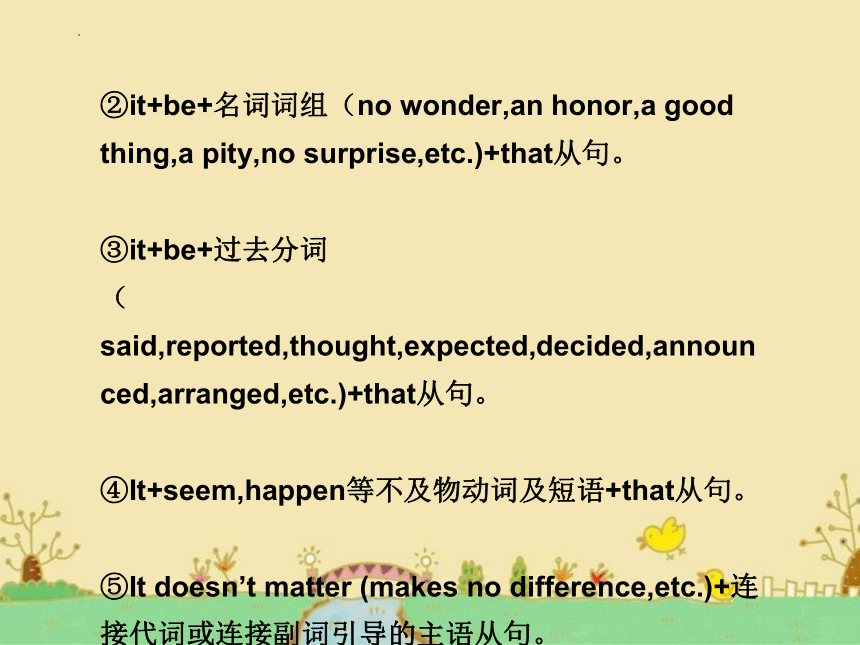
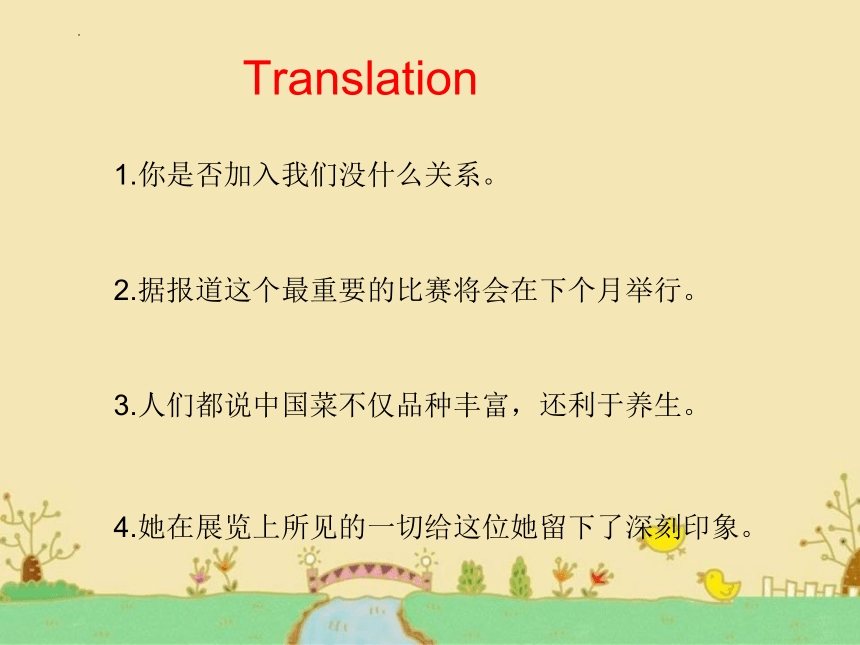
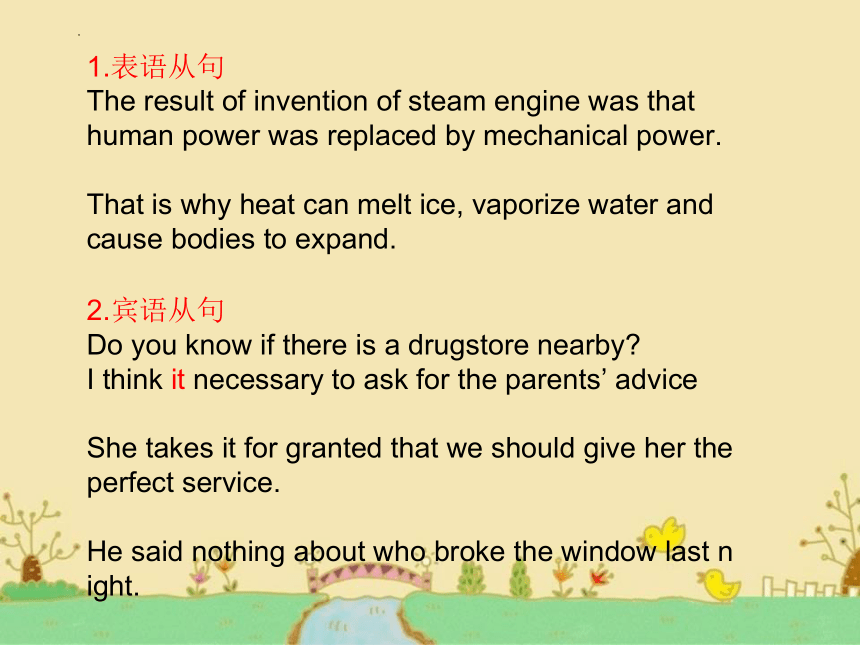
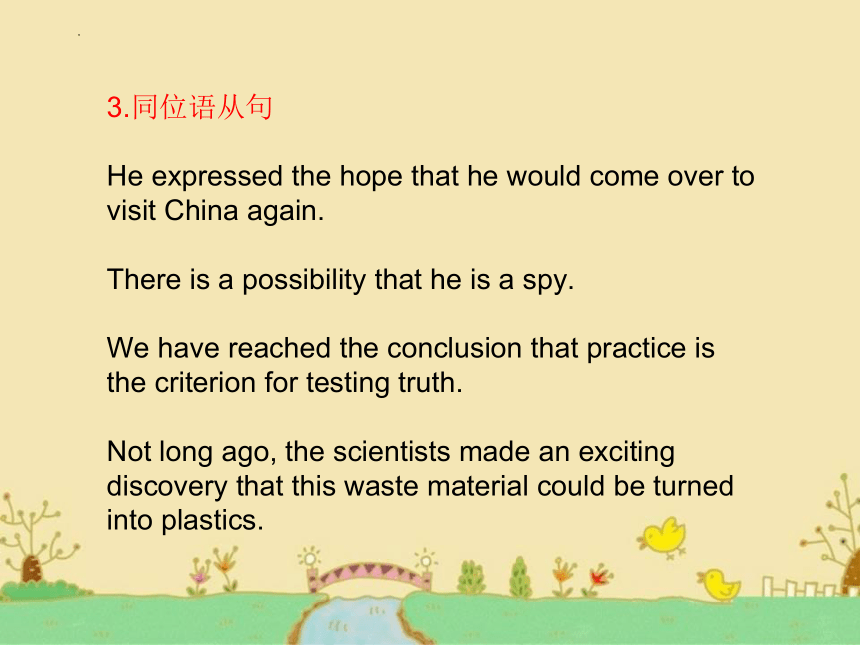
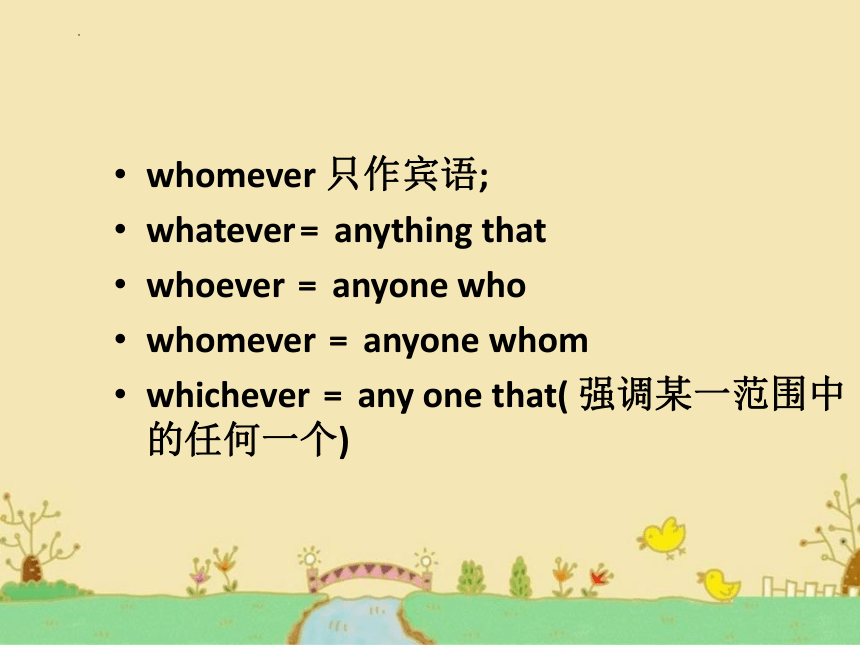
文档简介
(共23张PPT)
复合句专题讲解
复合句的种类
1.名词性从句
2.形容词性从句(定语从句)
3.副词性从句(状语从句)
一、名词性从句
名词性从句包括主语从句、宾语从句、表语从句和同位语从句.
引导词:
1. 从属连词:that, if , whether
2. 连接代词: who, what, which, whom, whose
3. 连接副词: when, where, how, why等.
?
1.主语从句?
(1)引导主语从句的关联词有:that(不充当句子成分,仅起引导作用,通常用it作形式主语),whether,who,whom,whose,what,which,whoever,whatever,whichever,where,when,how,why。?
(2)主语从句能用it作形式上的主语。常用it作形式主语的句型有:?
①it+be+形容词(obvious,natural,surprising,
wonderful,possible,likely,certain,probable,etc.)+that从句。?
②it+be+名词词组(no wonder,an honor,a good thing,a pity,no surprise,etc.)+that从句。?
③it+be+过去分词(said,reported,thought,expected,decided,announced,arranged,etc.)+that从句。?
④It+seem,happen等不及物动词及短语+that从句。
⑤It doesn’t matter (makes no difference,etc.)+连接代词或连接副词引导的主语从句。?
1.你是否加入我们没什么关系。
2.据报道这个最重要的比赛将会在下个月举行。
3.人们都说中国菜不仅品种丰富,还利于养生。
4.她在展览上所见的一切给这位她留下了深刻印象。
Translation
1.表语从句
The result of invention of steam engine was that
human power was replaced by mechanical power.
That is why heat can melt ice, vaporize water and cause bodies to expand.
2.宾语从句
Do you know if there is a drugstore nearby
I think it necessary to ask for the parents’ advice
She takes it for granted that we should give her theperfect service.
He said nothing about who broke the window last night.
3.同位语从句
He expressed the hope that he would come over to visit China again.
There is a possibility that he is a spy.
We have reached the conclusion that practice is the criterion for testing truth.
Not long ago, the scientists made an exciting discovery that this waste material could be turned into plastics.
whomever 只作宾语;
whatever﹦anything that
whoever ﹦anyone who
whomever ﹦anyone whom
whichever ﹦any one that( 强调某一范围中的任何一个)
1.那就是中国在近三十年变化如此之快的原因。
2.我不确定他什么时候回到家乡。
3.他对中国文化很感兴趣不可否认。
4.为什么越来越多的人沉迷游戏,这个问题值得重视。
Translation
二、定语从句
引导词分为两类:
1. 关系代词: who, whom, whose, which, that, as
2. 关系副词: where, when, why等
引导词的作用:
1. 代替先行词;
2. 引导定语从句;
3. 在从句中充当成分, 关系代词作主语, 宾语(可以省略), 表语; 关系副词作状语.
定语从句难点
1.whose引导的定语从句.
whose 作定与修饰后面的名词, 可修饰人或物,
相当于…of whom , …of which
Eg. ① His the student whose composition(﹦the composition of whom) won the first prize.
② I refer to the house whose window (﹦the window of which ) faces the lake.
2.which和as 引导非限制性定语从句的区别
which引导的非限制性定语从句只能放在主句的
后面, as引导非限制性定语从句时放在主句前后
均可;
as意为“正如”, 后面的谓语动词多是see, know,
expect, say, mention, report等.另外用于某固定搭
配, 如the same…as, such…as等; which意为“这
一点”, 如:
As we all know, he studies very hard.
He turned out to be very successful, which was more than we could expect.
3.介词提前的定语从句
介词+which/ whom, 不能用that 或who
如何选用合适的介词:
根据后面动词和介词的搭配关系选择.
Eg. The two things __ ____ they felt proud were Jim’s
gold watch and Della’s hair.
2. When, where, why 既可引导名词性从句, 又可引导定语从句或状语从句, 而且有时可以互相转化.
When he will come is still unknown. →The time when he will come …
I don’t know where he found his last bike. →I don’t know the place where( at which) he found …
I don’t know why he missed the meeting. →I don’t know the reason why he missed…
The new house stands where there was a pool. →The new house stands at the place where there was a pool.
3. Whoever, whatever whichever 可引导名词性从句或状语从句.
Whoever breaks the law should be punished. →Anyone who breaks the law should…
Whoever calls, ask him to leave a message. →No matter who calls, ask him…
4. as可引导多种从句
As he hadn’t worked hard, he failed.
As he was 15 years old, he began to work in a factory.
Yong as he is, he knows a lot.
As can be seen, he is sad.
As time passed by, I gradually forgot what he looked like.
I can do it as well as you.
一个不向别人学习的人是不能指望有多少成就的。
实验中的良好结果给了他莫大的鼓舞。
我从这里路过时,看到一个人在屋子里写字。
他去过巴黎,他认为巴黎是世界上最美的城市。
我们把郊游推迟到下星期,那时我们就不会这么忙了。
状
语
从
句
·时间状语从句
·地点状语从句
·原因状语从句
·方式状语从句
·结果状语从句
·目的状语从句
·条件状语从句
·让步状语从句
·比较状语从句
地点状语从句—
原因状语从句—
where, wherever
because, since, as; now (that), in that, seeing (that)
方式状语从句—
结果状语从句—
目的状语从句—
条件状语从句—
让步状语从句—
比较状语从句—
as; as if, as though
so/such …that …; such that …;so that…
in order that, so that, for fear that, lest, in case
if, unless; in case; as/ so long as; on condition that; provided/providing; supposing/suppose; given; when, while
although, though; no matter +wh-/how, wh-ever/however; even if, even though; when, while,whether;
than, as
although/ as /though的用法:
Which of the following is right _______
A child as he is, he can tell right from wrong.
Child as he is, but he can tell right from wrong.
Child though he is, yet he can tell right from wrong.
Child although he is, he can tell right from wrong.
_______________________ (尽管我很喜欢它), I will not buy the dress.
_____________________ (尽管他会尝试), he might fail again.
Much as / though I like it
Try as/though he would
你认为他来回答这些问题很难吗?
据报道在那个地区又建了一所新学校。
她出生的那个村庄很美。
当他昨晚来我家时,我已经完成了自己的英语作业。
老师告诉我们英国英语与美国英语拼写方面有些不同。
What I usually like to do over lunch is have a mindless conversation with a couple of students who have also learnt to smell the roses along the bone breaking journey through high school.
尽管他很聪明,他还是每天很努力学习。
一些人对中国饮食比较感兴趣,而另一些人对中国剪纸艺术很着迷。
Thank you!
See you tomorrow.
复合句专题讲解
复合句的种类
1.名词性从句
2.形容词性从句(定语从句)
3.副词性从句(状语从句)
一、名词性从句
名词性从句包括主语从句、宾语从句、表语从句和同位语从句.
引导词:
1. 从属连词:that, if , whether
2. 连接代词: who, what, which, whom, whose
3. 连接副词: when, where, how, why等.
?
1.主语从句?
(1)引导主语从句的关联词有:that(不充当句子成分,仅起引导作用,通常用it作形式主语),whether,who,whom,whose,what,which,whoever,whatever,whichever,where,when,how,why。?
(2)主语从句能用it作形式上的主语。常用it作形式主语的句型有:?
①it+be+形容词(obvious,natural,surprising,
wonderful,possible,likely,certain,probable,etc.)+that从句。?
②it+be+名词词组(no wonder,an honor,a good thing,a pity,no surprise,etc.)+that从句。?
③it+be+过去分词(said,reported,thought,expected,decided,announced,arranged,etc.)+that从句。?
④It+seem,happen等不及物动词及短语+that从句。
⑤It doesn’t matter (makes no difference,etc.)+连接代词或连接副词引导的主语从句。?
1.你是否加入我们没什么关系。
2.据报道这个最重要的比赛将会在下个月举行。
3.人们都说中国菜不仅品种丰富,还利于养生。
4.她在展览上所见的一切给这位她留下了深刻印象。
Translation
1.表语从句
The result of invention of steam engine was that
human power was replaced by mechanical power.
That is why heat can melt ice, vaporize water and cause bodies to expand.
2.宾语从句
Do you know if there is a drugstore nearby
I think it necessary to ask for the parents’ advice
She takes it for granted that we should give her theperfect service.
He said nothing about who broke the window last night.
3.同位语从句
He expressed the hope that he would come over to visit China again.
There is a possibility that he is a spy.
We have reached the conclusion that practice is the criterion for testing truth.
Not long ago, the scientists made an exciting discovery that this waste material could be turned into plastics.
whomever 只作宾语;
whatever﹦anything that
whoever ﹦anyone who
whomever ﹦anyone whom
whichever ﹦any one that( 强调某一范围中的任何一个)
1.那就是中国在近三十年变化如此之快的原因。
2.我不确定他什么时候回到家乡。
3.他对中国文化很感兴趣不可否认。
4.为什么越来越多的人沉迷游戏,这个问题值得重视。
Translation
二、定语从句
引导词分为两类:
1. 关系代词: who, whom, whose, which, that, as
2. 关系副词: where, when, why等
引导词的作用:
1. 代替先行词;
2. 引导定语从句;
3. 在从句中充当成分, 关系代词作主语, 宾语(可以省略), 表语; 关系副词作状语.
定语从句难点
1.whose引导的定语从句.
whose 作定与修饰后面的名词, 可修饰人或物,
相当于…of whom , …of which
Eg. ① His the student whose composition(﹦the composition of whom) won the first prize.
② I refer to the house whose window (﹦the window of which ) faces the lake.
2.which和as 引导非限制性定语从句的区别
which引导的非限制性定语从句只能放在主句的
后面, as引导非限制性定语从句时放在主句前后
均可;
as意为“正如”, 后面的谓语动词多是see, know,
expect, say, mention, report等.另外用于某固定搭
配, 如the same…as, such…as等; which意为“这
一点”, 如:
As we all know, he studies very hard.
He turned out to be very successful, which was more than we could expect.
3.介词提前的定语从句
介词+which/ whom, 不能用that 或who
如何选用合适的介词:
根据后面动词和介词的搭配关系选择.
Eg. The two things __ ____ they felt proud were Jim’s
gold watch and Della’s hair.
2. When, where, why 既可引导名词性从句, 又可引导定语从句或状语从句, 而且有时可以互相转化.
When he will come is still unknown. →The time when he will come …
I don’t know where he found his last bike. →I don’t know the place where( at which) he found …
I don’t know why he missed the meeting. →I don’t know the reason why he missed…
The new house stands where there was a pool. →The new house stands at the place where there was a pool.
3. Whoever, whatever whichever 可引导名词性从句或状语从句.
Whoever breaks the law should be punished. →Anyone who breaks the law should…
Whoever calls, ask him to leave a message. →No matter who calls, ask him…
4. as可引导多种从句
As he hadn’t worked hard, he failed.
As he was 15 years old, he began to work in a factory.
Yong as he is, he knows a lot.
As can be seen, he is sad.
As time passed by, I gradually forgot what he looked like.
I can do it as well as you.
一个不向别人学习的人是不能指望有多少成就的。
实验中的良好结果给了他莫大的鼓舞。
我从这里路过时,看到一个人在屋子里写字。
他去过巴黎,他认为巴黎是世界上最美的城市。
我们把郊游推迟到下星期,那时我们就不会这么忙了。
状
语
从
句
·时间状语从句
·地点状语从句
·原因状语从句
·方式状语从句
·结果状语从句
·目的状语从句
·条件状语从句
·让步状语从句
·比较状语从句
地点状语从句—
原因状语从句—
where, wherever
because, since, as; now (that), in that, seeing (that)
方式状语从句—
结果状语从句—
目的状语从句—
条件状语从句—
让步状语从句—
比较状语从句—
as; as if, as though
so/such …that …; such that …;so that…
in order that, so that, for fear that, lest, in case
if, unless; in case; as/ so long as; on condition that; provided/providing; supposing/suppose; given; when, while
although, though; no matter +wh-/how, wh-ever/however; even if, even though; when, while,whether;
than, as
although/ as /though的用法:
Which of the following is right _______
A child as he is, he can tell right from wrong.
Child as he is, but he can tell right from wrong.
Child though he is, yet he can tell right from wrong.
Child although he is, he can tell right from wrong.
_______________________ (尽管我很喜欢它), I will not buy the dress.
_____________________ (尽管他会尝试), he might fail again.
Much as / though I like it
Try as/though he would
你认为他来回答这些问题很难吗?
据报道在那个地区又建了一所新学校。
她出生的那个村庄很美。
当他昨晚来我家时,我已经完成了自己的英语作业。
老师告诉我们英国英语与美国英语拼写方面有些不同。
What I usually like to do over lunch is have a mindless conversation with a couple of students who have also learnt to smell the roses along the bone breaking journey through high school.
尽管他很聪明,他还是每天很努力学习。
一些人对中国饮食比较感兴趣,而另一些人对中国剪纸艺术很着迷。
Thank you!
See you tomorrow.
